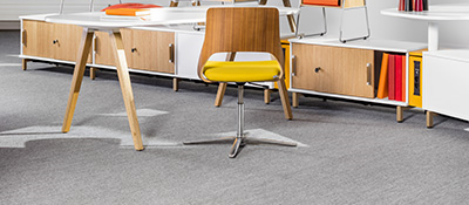August 3, 2016
Third of people have nobody to talk to about stress, claims report 0
 A new survey by office products supplier Viking claims that a third of workers suffer from stress and yet have no one to talk to about it. The authors of the study claims that these findings correlate strongly with people’s overall levels of fulfilment at work, with 46 percent of those surveyed saying they had negative thoughts about their job several times a week. When it comes to a person’s working environment, the results showed that office workers were more stressed than those working from home. Factors that contributed to these stress levels included working overtime, not taking enough breaks, having no one to talk to, job satisfaction, pressure to succeed. It’s no surprise that a lack of breaks is causing stress, with half of office workers admitting to taking no breaks at all during the day, excluding lunch. Conversely, a massive 61 percent of people working from home said they took two to three breaks throughout the day.
A new survey by office products supplier Viking claims that a third of workers suffer from stress and yet have no one to talk to about it. The authors of the study claims that these findings correlate strongly with people’s overall levels of fulfilment at work, with 46 percent of those surveyed saying they had negative thoughts about their job several times a week. When it comes to a person’s working environment, the results showed that office workers were more stressed than those working from home. Factors that contributed to these stress levels included working overtime, not taking enough breaks, having no one to talk to, job satisfaction, pressure to succeed. It’s no surprise that a lack of breaks is causing stress, with half of office workers admitting to taking no breaks at all during the day, excluding lunch. Conversely, a massive 61 percent of people working from home said they took two to three breaks throughout the day.







 Working on complex tasks and work that is based on interactions with other people rather than data or things appear to protect against cognitive decline, according to research presented at the Alzheimer’s Association’s International Conference in Toronto. Researchers in two separate studies claim that people whose work requires complex thinking and activities are better able to withstand the wider causes of cognitive decline. The results suggest that working with people, rather than data or physical things, contributed the most to the protective effect and could offset the widely reported effects of a Western diet on cognitive ability. Researchers found that people with increased white matter hyperintensities (WMHs) – white spots that appear on brain scans and are commonly associated with Alzheimer’s and cognitive decline – could better tolerate WMH-related damage if they worked primarily with other people rather than with things or data.
Working on complex tasks and work that is based on interactions with other people rather than data or things appear to protect against cognitive decline, according to research presented at the Alzheimer’s Association’s International Conference in Toronto. Researchers in two separate studies claim that people whose work requires complex thinking and activities are better able to withstand the wider causes of cognitive decline. The results suggest that working with people, rather than data or physical things, contributed the most to the protective effect and could offset the widely reported effects of a Western diet on cognitive ability. Researchers found that people with increased white matter hyperintensities (WMHs) – white spots that appear on brain scans and are commonly associated with Alzheimer’s and cognitive decline – could better tolerate WMH-related damage if they worked primarily with other people rather than with things or data.



 There is no doubt that the UK’s office based knowledge industry is facing a crisis in the form of a ‘wellbeing deficit’. Both the Confederation of British Industry (CBI) and Health and Safety Executive (HSE) have reported record levels of absenteeism, with the latter attributing 23.3 million lost working days to work-related ill-health, such as depression, stress, anxiety and musculoskeletal disorders. A great deal is already known about the causes of the key issues of employee stress and demotivation, but more work needs to be done to establish how organisations can meet their corporate goals with regard to these issues, whilst still engaging, motivating and nurturing their workforce. A significant body of published research has identified that a sense of ‘personal control’ can have a hugely positive impact on employee wellbeing, but how can we engender that control when it comes to creating a productive working environment?
There is no doubt that the UK’s office based knowledge industry is facing a crisis in the form of a ‘wellbeing deficit’. Both the Confederation of British Industry (CBI) and Health and Safety Executive (HSE) have reported record levels of absenteeism, with the latter attributing 23.3 million lost working days to work-related ill-health, such as depression, stress, anxiety and musculoskeletal disorders. A great deal is already known about the causes of the key issues of employee stress and demotivation, but more work needs to be done to establish how organisations can meet their corporate goals with regard to these issues, whilst still engaging, motivating and nurturing their workforce. A significant body of published research has identified that a sense of ‘personal control’ can have a hugely positive impact on employee wellbeing, but how can we engender that control when it comes to creating a productive working environment?



















August 2, 2016
What Anaïs Nin can teach us about the way we design and use workplaces
by Mark Eltringham • Comment, Facilities management, Workplace design
(more…)